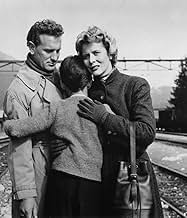NOTE IMDb
6,9/10
325
MA NOTE
Ajouter une intrigue dans votre langueA story of litigation between a birth mother and an adopted family due to a child lost during a war.A story of litigation between a birth mother and an adopted family due to a child lost during a war.A story of litigation between a birth mother and an adopted family due to a child lost during a war.
- Réalisation
- Scénario
- Casting principal
- Victoire aux 3 BAFTA Awards
- 4 victoires et 3 nominations au total
André Mikhelson
- Prof. Miran
- (as Andre Mikhelson)
Mark Gübhard
- Max
- (as Mark Guebhard)
Martin Stephens
- Hans
- (as Martin Stevens)
Commentaire à la une
It shows how superficial my expectations are of a black and white film that I only watched this because I was ill, and it was either this, a cooking show or "Take the High Road" (an awful Scottish Soap.
What I found was a film full of believable characterisations that was not afraid to tackle a very difficult subject, where the true mother of a Yugoslavian boy raised by German foster parents during the Second World War returns to reclaim her child ten years later.
What makes the subject matter so difficult is the way in which the boy comes to be made available for adoption through the attrocities of the war. The two flashbacks are very well done, making you care about both of the women and the love they feel for the child - the subdued Yugoslav mother, speaking through an interpreter, refusing to betray her emotions in public having been scarred by her experiences, (I thought the short scene where she is in the church looking at Mary and baby Jesus was very revealing) and the German woman who has raised the child during his formative years.
The three judges from the American Control Commission are called upon to make the impossible decision, and the judgements that each of them decide, though different, ring true.
I was surprised by the abruptness of the ending, wishing to see what Toni would do in later year, but that is my only criticism of this film.
What I found was a film full of believable characterisations that was not afraid to tackle a very difficult subject, where the true mother of a Yugoslavian boy raised by German foster parents during the Second World War returns to reclaim her child ten years later.
What makes the subject matter so difficult is the way in which the boy comes to be made available for adoption through the attrocities of the war. The two flashbacks are very well done, making you care about both of the women and the love they feel for the child - the subdued Yugoslav mother, speaking through an interpreter, refusing to betray her emotions in public having been scarred by her experiences, (I thought the short scene where she is in the church looking at Mary and baby Jesus was very revealing) and the German woman who has raised the child during his formative years.
The three judges from the American Control Commission are called upon to make the impossible decision, and the judgements that each of them decide, though different, ring true.
I was surprised by the abruptness of the ending, wishing to see what Toni would do in later year, but that is my only criticism of this film.
Histoire
Le saviez-vous
- Citations
First Justice: Wars leave behind a stain of shame which the centuries will not wash away.
Meilleurs choix
Connectez-vous pour évaluer et suivre la liste de favoris afin de recevoir des recommandations personnalisées
Détails
- Date de sortie
- Pays d’origine
- Langues
- Aussi connu sous le nom de
- The Divided Heart
- Lieux de tournage
- Sociétés de production
- Voir plus de crédits d'entreprise sur IMDbPro
- Durée1 heure 29 minutes
- Couleur
- Rapport de forme
- 1.37 : 1
Contribuer à cette page
Suggérer une modification ou ajouter du contenu manquant

Lacune principale
By what name was Les hommes ne comprendront jamais (1954) officially released in India in English?
Répondre





























